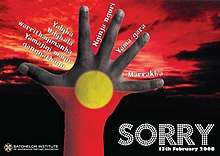National Sorry Day
| National Sorry Day | |
|---|---|
| Also called | Sorry Day |
| Observed by |
|
| Type | Cultural |
| Significance | Remember and commemorate the mistreatment of Australia's indigenous population |
| Date | 26 May |
| Next time | 26 May 2019 |
| Frequency | Yearly |
| First time | 26 May 1998 |
National Sorry Day is an annual event that has been held in Australia on 26 May, since 1998, to remember and commemorate the mistreatment of the country's Aboriginal People. During the 20th century, Australian government policies resulted in a "Stolen Generation", described by John Torpey as "Aboriginal children separated, often forcibly, from their families in the interest of turning them into white Australians".[1]
On 26 May 1997, the Bringing Them Home report was tabled in Parliament. The date 26 May carries great significance for the Stolen Generations, as well as for Aboriginal and Torres Strait Islander communities, and its supporters among non-indigenous Australians.
Background
An older indigenous protest day is the Day of Mourning, which originated in 1938, focusing on land loss and mistreatment.

The 1997 Bringing Them Home report recommended that the Prime Minister apologise to the Stolen Generation. Prime Minister John Howard refused to do so, stating that he "did not subscribe to the black armband view of history".[2]
On 26 August 1999, Prime Minister John Howard moved a Motion of Reconciliation, which included an expression of "deep and sincere regret that indigenous Australians suffered injustices under the practices of past generations, and for the hurt and trauma that many indigenous people continue to feel as a consequence of those practices".[3] The opposition leader, Kim Beazley, moved to replace John Howard's motion of regret with an unreserved apology which was not successful.[4]
In response, a popular movement evolved to celebrate "sorry day" in the absence of formal political recognition from the conservative government.
The annual commemorations are intended to raise awareness among politicians, policy makers, and the wider public about the forcible removal policies and their impact on the children who were taken, their families and their communities.
On 13 February 2008, then Prime Minister Kevin Rudd moved a motion of Apology to the Indigenous Australian "Stolen Generation".[5] The apology was the new parliament's first order of business; Rudd became the first Australian Prime Minister to publicly apologise to the Stolen Generations on behalf of the Australian federal government.
See also
- Day of Mourning (Australia)
- Harmony Day
- I Apologize campaign, a grassroots initiative in Turkey
- Mabo Day
- NAIDOC Week
- National Reconciliation Week
- Native American Day
References
- ↑ Torpey, John C. (2006). Making Whole What Has Been Smashed: On Reparations Politics. Cambridge, MA: Harvard University Press. p. 4. ISBN 9780674019430.
- ↑ McKenna, Dr Mark (10 November 1997). "Different Perspectives on Black Armband History". Parliament of Australia Parliamentary Library. Retrieved 2 November 2006.
- ↑ "Motion of Reconciliation". parlinfo.aph.gov.au. Parliament of Australia. 26 August 1999. Retrieved 26 August 2017.
- ↑ "House of representatives Hansard Thursday 26 August 1999" (PDF). Parliament of Australia Hansard. 26 August 1999. p. 152. Retrieved 4 November 2006.
- ↑ "Official Australian Government Website – Sorry Day and the Stolen Generation". Australian Government. Retrieved 21 February 2012.
External links
- Sorry Day and the Stolen Generations
- Stolen Generations Alliance
- Stolen Generations Testimonies Project
- The Aboriginal and Torres Strait Islander Healing Foundation
- Reconciliation Australia
- Kimberley Stolen Generation Aboriginal Corporation
- The National Apology - Snapshots of relevant webpages from 2008